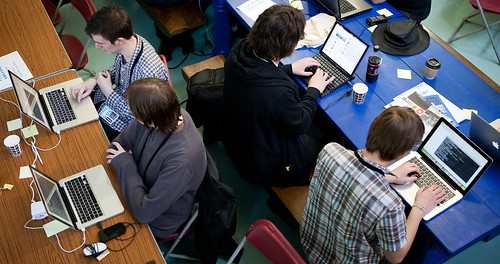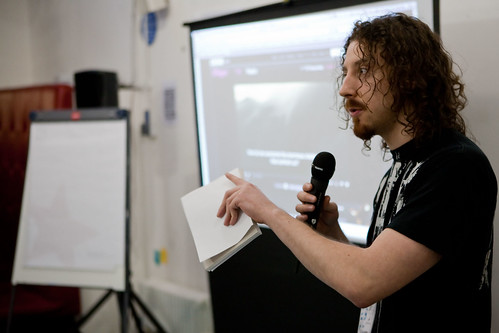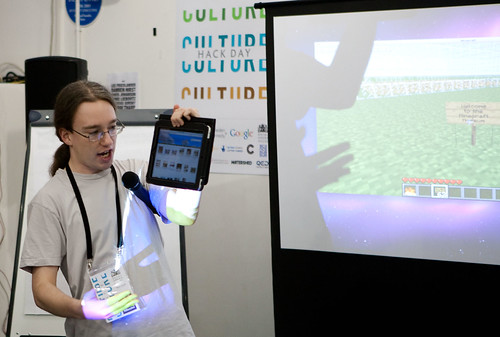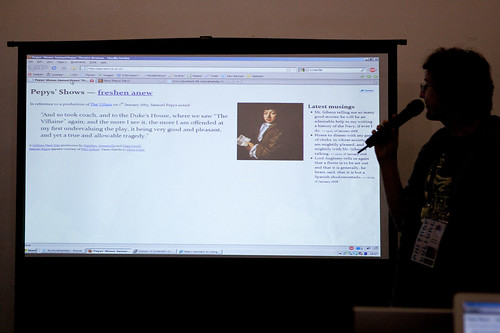Posted on Wed 19 Jan 2011
Culture Hackday 2011

I spent last weekend in the basement of the Wieden+Kennedy offices for Culture Hackday. Culture Hackday gathers together developers and designers to see what they can build in 24 hours.
Alongside the hands on hacking there was an afternoon of lightning talks on the Saturday. There are writeups of those talks by Roo Reynolds, Meshed Media and Mia Ridge
Various cultural organisations brought along data and APIs. The most interesting of which to me was the UK Film Councils database of all films shown in the UK for the past few years including ticket sales, prices and screening locations. Unfortunately its massive >60GB size meant it took quite a few hours for people to get started working with it but I'm sure it'll be fascinating to play with in the future.
Visualising Movies
Films were quite a popular topic for hacks. Melinda Seckington sliced through and visualised various aspects of box office sales for 2010, Brendan Quinn animated maps of film ticket sales geographically and Movie Stub showed changing genre popularity over time where you live. I joined in the visualisation trend myself and made When Should I Visit - an app that attempts to predict when the least busy time to visit a museum or gallery is using data from foursquare.
Hacking the BBC
Hacking the BBC was popular, as it usually is at hackdays. The BBC has a lot of different APIs and continues to open up more data. They even ran the UKs biggest and first hackdays in the past as part of the now sadly closed BBC Backstage. Caz Mockett made the Radio Times archive listings browsable, letting you see what was on TV the day you were born or check how often Bagpus was repeated. Ben Firshman made an app that generated Haikus from iPlayer subtitles and then played them back by stitching together segments of the original iplayer videos. Meanwhile Subvertle took iPlayer subtitles and allowed them to be translated between languages in real time. Or to add in swearing. While somewhat crude it did match with Tom Armitage's lightning talk of the previous day about Kanye Jordan - "a joke so good even a machine can make it".
Playful hacks
Many of the hacks were delightfully playful, taking quite dry datasets and APIs and using them to entertain. One of these was the Minecraft Museum which takes photographs of artworks and other items in the collections of museums around the UK and then builds a 3D copy of them inside the hugely popular game Minecraft ("Like second life, but fun"). Anyone can build their own mini museum for when they can't travel to a gallery.
Culture Grid
The data for Minecraft Museum comes from the Culture Grid API. Culture Grid is attempting to make a single place where you can explore the collections of all the cultural institutions in the UK and make it available through a single API. It has everything from WW2 posters to dinosaur bones. Stef Lewandowski made a ruby gem for accessing the data easier and an API for getting higher resolution images of collection items. ArtFinder used the Culture Grid API to generate iPad apps for specific artists.
Theatres
Mark James made google maps mashup Tesco Fresco to compare the geographical distribution of Tesco vs Theatres. Pepys' Shows displays theatre reviews by Samuel Pepys. Meanwhile Luke Blaney had been creating an ontology for how you represent theatre in data. Currently every theatre does it differently and a standard might make hacking easier in future.
Overall a very enjoyable weekend run by the Royal Opera house. Hopefully we shall see more cultural hacks in the future.




